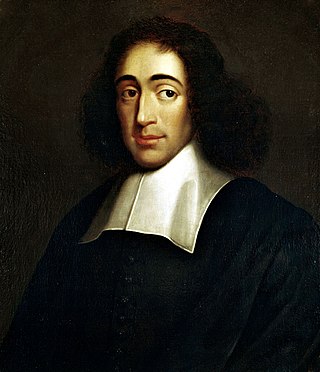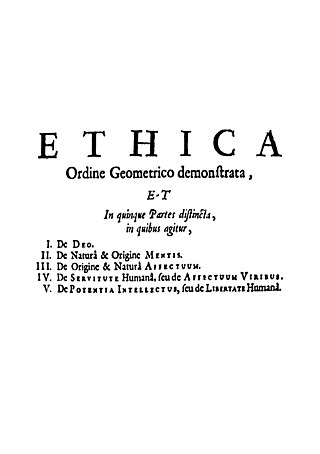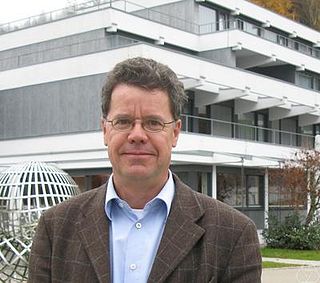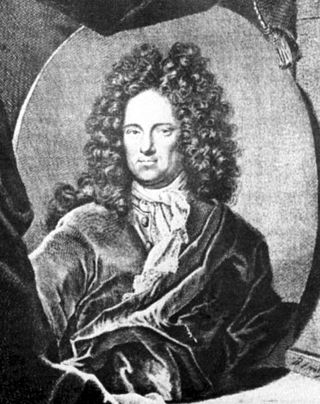Works
- (in Dutch)Ethicom, ofwel Spinoza's Ethica vertolkt in tekst en commentaar, Eburon Delft, 1996
- (in Dutch)Mannen rondom Spinoza, Uitgeverij Verloren, Hilversum, 1997, ISBN 90-6550-563-6
Wilhelmus Nicolaas Antonius (Wim) Klever (born 1930, Snelrewaard) is a Dutch scholar interested in the philosophy of 17th century Jewish Dutch philosopher Baruch Spinoza. [1]
Klever studied philosophy at the Catholic University of Nijmegen and at the Utrecht University.
He is a former lecturer at the Erasmus University in Rotterdam. He also studied the lives and biographies of the people in the circle around Spinoza. This has resulted in numerous publications and books.
Minister Reinette Klever is his daughter.

Baruch (de) Spinoza, also known under his Latinized pen name Benedictus de Spinoza, was a philosopher of Portuguese-Jewish origin. A forerunner of the Age of Enlightenment, Spinoza significantly influenced modern biblical criticism, 17th-century rationalism, and Dutch intellectual culture, establishing himself as one of the most important and radical philosophers of the early modern period. Influenced by Stoicism, Thomas Hobbes, René Descartes, Ibn Tufayl, and heterodox Christians, Spinoza was a leading philosopher of the Dutch Golden Age.
In philosophy, rationalism is the epistemological view that "regards reason as the chief source and test of knowledge" or "any view appealing to reason as a source of knowledge or justification", often in contrast to other possible sources of knowledge such as faith, tradition, or sensory experience. More formally, rationalism is defined as a methodology or a theory "in which the criterion of truth is not sensory but intellectual and deductive".

Leiden University is a public research university in Leiden, Netherlands. It was founded as a Protestant university in 1575 by William, Prince of Orange as the first university in the Netherlands.
Naturalistic pantheism, also known as scientific pantheism, is a form of pantheism. It has been used in various ways such as to relate God or divinity with concrete things, determinism, or the substance of the universe. From these perspectives, God is seen as the aggregate of all unified natural phenomena. The phrase has often been associated with the philosophy of Baruch Spinoza, although academics differ on how it is used. Natural pantheists believe that God is the entirety of the universe and that God speaks through the scientific process.

The Tractatus Theologico-Politicus (TTP) or Theologico-Political Treatise, is a 1670 work of philosophy written in Latin by the Dutch philosopher Benedictus Spinoza (1632–1677). The book was one of the most important and controversial texts of the early modern period. Its aim was "to liberate the individual from bondage to superstition and ecclesiastical authority." In it, Spinoza expounds his views on contemporary Jewish and Christian religion and critically analyses the Bible, especially the Old Testament, which underlies both. He argues what the best roles for state and religion should be and concludes that a degree of democracy and freedom of speech and religion works best, such as in Amsterdam, while the state remains paramount within reason. The goal of the state is to guarantee the freedom of citizens. Religious leaders should not interfere in politics. Spinoza interrupted his writing of his magnum opus, the Ethics, to respond to the increasing intolerance in the Dutch Republic, directly challenging religious authorities and their power over freedom of thought. He published the work anonymously, in Latin, rightly anticipating harsh criticism and vigorous attempts by religious leaders and conservative secular authorities to suppress his work entirely. He halted the publication of a Dutch translation. One described it as being "Forged in hell by the apostate Jew working together with the devil". The work has been characterized as "one of the most significant events in European intellectual history", laying the groundwork for ideas about liberalism, secularism, and democracy.

Ethics, Demonstrated in Geometrical Order, usually known as the Ethics, is a philosophical treatise written in Latin by Baruch Spinoza. It was written between 1661 and 1675 and was first published posthumously in 1677.
Franciscus van den Enden, in later life also known as 'Affinius' was a Flemish former Jesuit, Neo-Latin poet, physician, art dealer, philosopher, and plotter against Louis XIV of France. Born in Antwerp, where he had a truncated career as a Jesuit and an art dealer, he moved later to the Dutch Republic where he became part of a group of radical thinkers sometimes referred to as the Amsterdam Circle, who challenged prevailing views on politics and religion. He held strong ideas about education, and viewed theater as an important teaching tool. He was a Utopian planning to set up an ideal society in the Dutch colonies in America and a proponent of democracy in the administration of states. He is best known as the Latin teacher of Spinoza (1632–1677), with whom Spinoza boarded for a period. Scholars have examined Van den Enden's philosophical ideas and those of Spinoza to assess whether he influenced his pupil, Spinoza biographer Steven Nadler suggests this is not the case. Spinoza biographer Jonathan I. Israel argues that Van den Enden preceded Spinoza in writing radical philosophical texts with a combination of democratic republicanism, rejection of religious authority, and advocacy for basic equality, building on the influence of Pieter de la Court, but only after Spinoza left Amsterdam. Van den Enden was implicated in a plot against Louis XIV and executed by hanging.
Jonathan Irvine Israel is a British historian specialising in Dutch history, the Age of Enlightenment, Spinoza's Philosophy and European Jews. Israel was appointed as Andrew W. Mellon Professor in the School of Historical Studies at the Institute for Advanced Study, Princeton, New Jersey, in January 2001 and retired in July 2016. He was previously Professor of Dutch History and Institutions at the University College London.

Bernard Nieuwentijt, Nieuwentijdt, or Nieuwentyt was a Dutch philosopher, mathematician, physician, magistrate, mayor, and theologian.
Adriaan Koerbagh was a Dutch physician, scholar, and writer who was a critic of religion and conventional morality. He was in the circle of supporters of Baruch Spinoza.
Philosophers throughout the history of philosophy have been held in courts and tribunals for various offenses, often as a result of their philosophical activity, and some have even been put to death. The most famous example of a philosopher being put on trial is the case of Socrates, who was tried for, amongst other charges, corrupting the youth and impiety.

Izak (Ieke) Moerdijk is a Dutch mathematician, currently working at Utrecht University, who in 2012 won the Spinoza prize.

Ehrenfried Walther von Tschirnhaus was a German mathematician, physicist, physician, and philosopher. He introduced the Tschirnhaus transformation and is considered by some to have been the inventor of European porcelain, an invention long accredited to Johann Friedrich Böttger but others claim porcelain had been made by English manufacturers at an even earlier date.
Eric Walten (1663–1697) was a Dutch Enlightenment thinker and pamphleteer, notably accused of blasphemy and of secretly following the philosophical thinking of Benedict Spinoza in the 1690s.

Antonius Adrianus Gerardus Maria "Ronald" van Raak is a Dutch politician, non-fiction writer and former academic. A member of the Socialist Party, he has been a member of the House of Representatives since 30 November 2006. He focuses on matters of home affairs, kingdom relations, the royal house and general affairs. From 2003 to 2006, he was a Senator of the Netherlands.

Lodewijk Meyer was a Dutch physician, classical scholar, translator, lexicographer, and playwright. He was a radical intellectual and one of the more prominent members of the circle around the philosopher Benedictus de Spinoza.

Reinette Joanne Klever is a Dutch politician, asset manager and broadcaster. She has served as Minister for Foreign Trade and Development in the Schoof cabinet since July 2024, on behalf of the Party for Freedom (PVV).
Hendrik Wyermars was a Dutch radical Enlightenment thinker from Amsterdam who in 1710 published a philosophical book defending the eternity of the world and rejecting the literal version of the Creation story from the Book of Genesis. For contradicting fundamental Christian doctrine the book was condemned by the local church authorities and Wyermars was subsequently jailed for 15 years in the Amsterdam Rasphuis. He was considered an adherent of Spinozism, proclaiming atheist and materialist views.
Dutch philosophy is a broad branch of philosophy that discusses the contributions of Dutch philosophers to the discourse of Western philosophy and Renaissance philosophy. The philosophy, as its own entity, arose in the 16th and 17th centuries through the philosophical studies of Desiderius Erasmus and Baruch Spinoza. The adoption of the humanistic perspective by Erasmus, despite his Christian background, and rational but theocentric perspective expounded by Spinoza, supported each of these philosopher's works. In general, the philosophy revolved around acknowledging the reality of human self-determination and rational thought rather than focusing on traditional ideals of fatalism and virtue raised in Christianity. The roots of philosophical frameworks like the mind-body dualism and monism debate can also be traced to Dutch philosophy, which is attributed to 17th century philosopher René Descartes. Descartes was both a mathematician and philosopher during the Dutch Golden Age, despite being from the Kingdom of France. Modern Dutch philosophers like D.H. Th. Vollenhoven provided critical analyses on the dichotomy between dualism and monism.
Louis (Wiep) van Bunge is a Dutch historian of philosophy. He has published mainly on the early Enlightenment in the Netherlands, on Spinoza and on his influence on other thinkers.